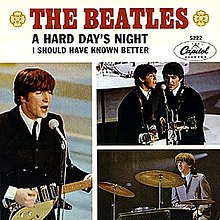GRAMMY WTF? 1964 Best Rock & Roll Recording. More: tomorrow.
The Grammy Awards are one of music’s most prestigious trophies. Since the inaugural ceremony in 1959, winners have spanned a vast array of musical styles and winners as diverse as Frank Sinatra, Aretha Franklin, Stevie Wonder, Eminem and Lizzo. There have, however, been some instances where one can’t comprehend the outcomes and omissions. Caffè Lattè looks back on some of the most baffling moments and unsuccessful -yet influential- acts…
GRAMMY WTF?
BEST ROCK & ROLL RECORDING 1964
WINNER:

NOMINATED BETTER CHOICE:

The Beatles changed rock and roll forever. With Beatlemania in full swing during 1964, the group from Liverpool was breaking records for charts and sales. Its dominance was felt across the globe. One would reasonably expect that The Beatles would have easily received a trophy in the category of Best Rock And Roll Recording.
Petula Clark’s “Downtown” collected that award. Her single was a worldwide smash, reaching #1 in America, Canada and Australia. She beat out Bobby Vinton’s “Mr. Lonely”, Roy Orbison’s “Oh, Pretty Woman”, The Righteous Brothers’ “You’ve Lost That Lovin’ Feelin’” and a song recorded by The Beatles. All 5 nominees had topped the US Pop Chart.
The nominated song by The Fab Four was “A Hard Day’s Night”; a mighty example of the quality pop output from this exciting new band from England. It reached #1 in America, the UK, Canada, Australia, New Zealand, in various European countries and in South Africa. The track was also the title song from The Beatles’ first feature film.
During 1964, The Beatles amassed 6 number one singles. No other act had come close in that year. “Downtown” is a great pop song, but it is not as closely associated with rock and roll as “A Hard Day’s Night”, which ought to have collected the Grammy in this case.
NEVER WON A GRAMMY AWARD*:
*(excludes life achievement categories)
THE DRIFTERS
In the 1950s, most R&B recordings were purchased by people of colour. Sanitized cover versions were recorded of the same songs by white artists. By the start of the 1960s, this situation had changed. R&B had crossed over and was building up a white fanbase. One of the key acts in this expansion was The Drifters. Beginning initially with Clyde McPhatter, then recruiting Ben E. King, this vocal group helped entice a new audience to rhythm and blues.
The Drifters enticed white consumers with some of the lushest R&B / soul productions of the time. Among these gems are the hits “Save The Last Dance For Me”, “There Goes My Baby”, “On Broadway”, “Under The Boardwalk” and “Up On The Roof”. Each of these recordings featured a higher standard of production that contributed to the songs’ crossover appeal.
Despite the group’s important role in expanding the market for soul music, The Drifters only received one Grammy nomination -for Best Rock And Roll Recording- but missed out. This is discussed in the previous post.
To make matters worse, lead singer Ben E. King received only one (unsuccessful) nomination for his solo material after quitting The Drifters. The Academy totally ignored his vocal delivery on cuts such as “Stand By Me”, “Spanish Harlem” and “Amor”.

No comments:
Post a Comment